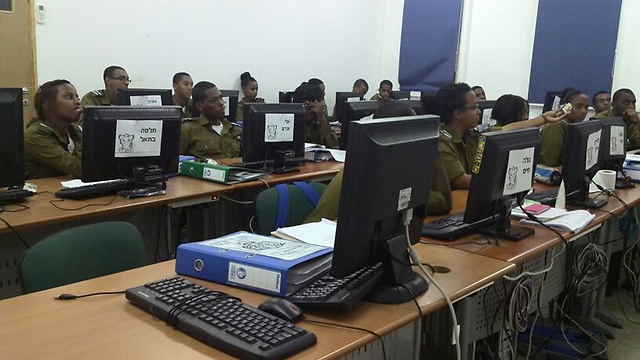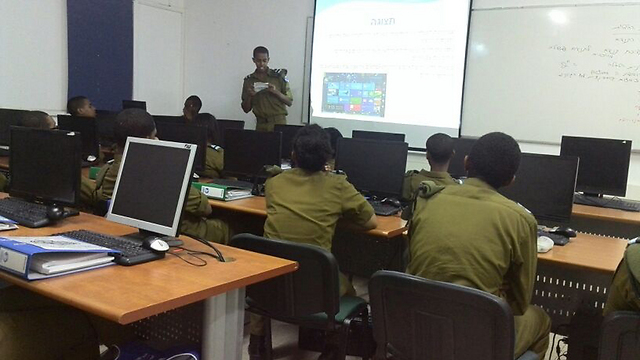In past years there have been harsh stories about segregation in schools, bringing about waves of protests. The army admits the issue is complicated, but it specifically believes that classrooms designed only for those of Ethiopian origin will bring about a positive change to the hard facts related to acclimatization, which have npt seen an improvement in many years.
Related stories:
- Kibbutzniks no longer core of officer corps
- Op-ed: Battle over Israel's face
- Only 1,200 Arabs in hi-tech? How to make a change
The purpose of this unprecedented move is to see whether a track only for members of the community will ease on the soldiers' integration.
"We have a real internal conflict standing in front of us, if it's right to implement a process of integration, or separation in order to create integration down the line," Brig.-Gen. Gadi Agmon, , the head of the Planning and Personnel Division with the Manpower Directorate, said while visiting Prison no. 4.
This visit characterizes the problem. Soldiers from the Ethiopian community represent 3% of the army, but 13% of jailed soldiers are also from the community. In addition, in 2012, 30% of Ethiopian soldiers served time in detention at least one time.
The commissioner of Soldier's Admissibility in the Defense Ministry, Gen. (ret.) Isaac Brick, said the high percentage of drop-outs from the Ethiopian community is the commanding officers' faults and not the soldiers. "The main reason for this obstinacy is the lack of attentiveness on the officers' and service condition officers' part. When soldiers from the (Ethiopian) community ask for days off to work in order to help their family, the officers treat them as if they were regular soldiers, not considering their needs."
Representatives from the IDF said the head of Manpower Directorate, Gen. Orna Barbivai, gave herself a target at the beginning of her tenure to take drastic steps that would change this phenomenon, which might reflect negatively on Israeli society when the soldiers finish their service.
In addition to this pilot project, there is also the Ethiopian Community Integration Department within the Manpower Directorate, which is tasked with worrying for the needs of soldiers, supporting them and their commanding officers and advancing integration programs in the army.
The new course has 19 soldiers from the Ethiopian community, and the majority of classes take place in an isolated civilian facility in central Israel. The teachers are from Tech-Career, the non-profit organization who started the program. With the support of the Ministry of Absorption, the organization helps integrate those from the Ethiopian community in technological professions after their army service. The officers in the course are from the Computer Service Directorate Branch, and the service condition officer who accompanies the soldiers is also from the Ethiopian community, to provide a common language.
The non-separated course lasts nine weeks, but the course for Ethiopian soldiers is four months in order to give more help to the soldiers, said the commanding officer of the computer professions school, Lt. Col. Orit Tatarsky. "From a cognitive and general abilities standpoint, this population is similar to the other populations, and if we won't know how to extract the potential then we'll lose it."
Reserve officers from the Ethiopian community were also recruited to be the soldiers' "big brothers".
Even though software testers are not considered the cream of the computer profession crop, this career does have a large demand in the hi-tech world.
Soldiers in the course admit that the separation looks weird but there are advantages. Pte. Bat-El Tasa said there's a benefit that everyone is from the same place. "It's more comfortable, it makes us feel at home," she said. "But there's also the disadvantage that it separates us from the general society. There are no white soldiers next to us."
- Receive Ynetnews updates
directly to your desktop

















